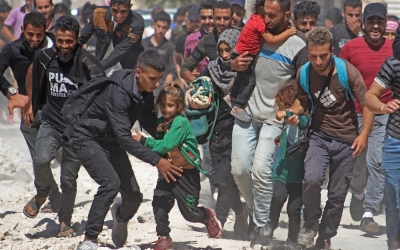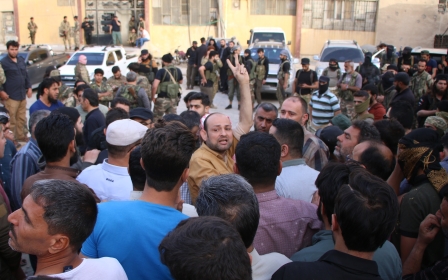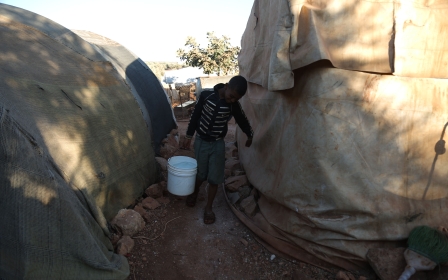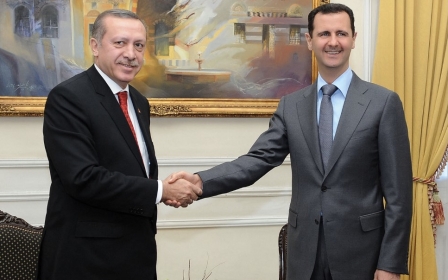Syria: Assassination of activist in northwestern city fuels anger at Turkish-backed rebels
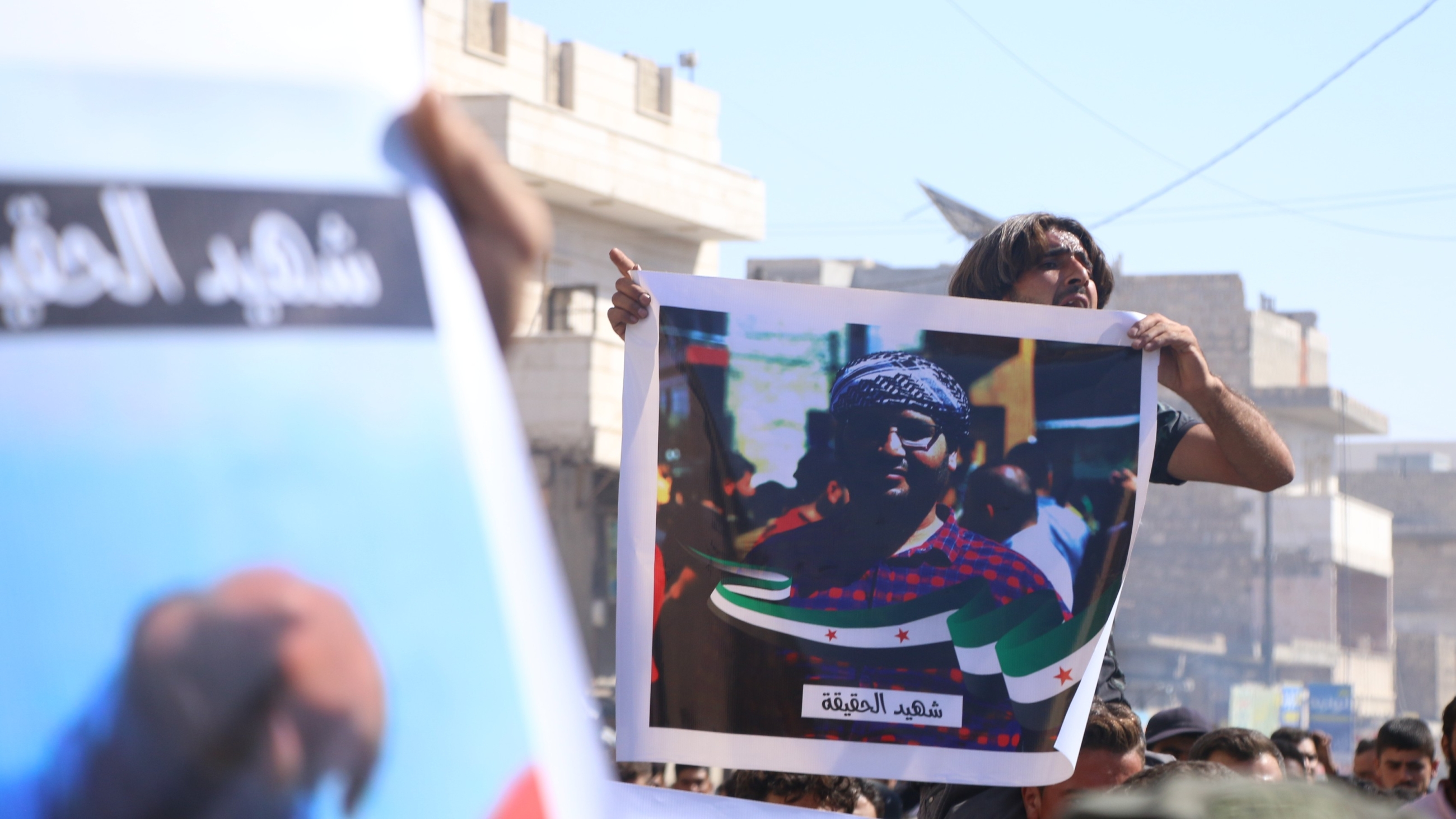
The assassination of a prominent Syrian activist has sparked anger in the Turkish-controlled northwestern city of al-Bab, as mourners demand justice and an end to corrupt rule in the city.
Muhammad Abdul Latif, known locally as Abo Ghanoum, was fatally shot as was his pregnant wife by unknown assailants on Friday night.
A city-wide commercial strike was observed on Saturday as thousands joined the activist's funeral, whose body was draped in the Syrian revolution flag that he long supported, as he was buried in the city.
Meanwhile, two funeral tents turned into sit-in centres to demand the local officials to find the killers and hold them accountable.
"I have two shops in the city, which I closed in response to the strike, and I am ready to continue the strike in the coming days until the local authorities find the killers," Mohammed al-Younis, a resident of al-Bab, told Middle East Eye.
New MEE newsletter: Jerusalem Dispatch
Sign up to get the latest insights and analysis on Israel-Palestine, alongside Turkey Unpacked and other MEE newsletters
"Surveillance cameras fill the city and yet they have not found those involved. Unfortunately, we suffer from the presence of mercenaries in the ranks of the rebels. If they were not mercenaries, they would have found the killers yesterday."
'Abo Ghanoum was a brother and a friend of all civilians and the voice of reason. He was killed because he told the truth'
- Mohammed al-Younis, al-Bab resident
Al-Bab is under the control of the Turkish-backed Syrian National Army (SNA), a coalition of anti-Assad rebel groups.
With Turkish support, a military police force - made up of members from each faction within the SNA - was formed in the city in mid-2018.
One of the main purposes of the force was to stop crime such as the smuggling of goods, drugs and other unauthorised crossings between government and opposition-held areas.
However, residents have been growing frustrated with it over allegations of arbitrary detentions and abuse against civilians, local police, charities and media.
Perceived inaction towards the killing of Abo Ghanoum, a prominent social justice advocate, has fuelled anger further.
"Abo Ghanoum was a brother and a friend of all civilians and the voice of reason. He was killed because he told the truth," al-Younis said.
Many enemies
Abo Ghanoum was known as a fierce critic of not only the government of Bashar al-Assad but also rebel groups in opposition-held areas, which are accused of abuse of power and corruption.
Last month, he received death threats after he confronted a commander from the al-Hamza group, which is part of the SNA, at the headquarters of the SNA's military police, activist Moataz Nasser told MEE.
"We expected that he would be targeted, but the big shock was the assassination of his pregnant wife with him," Nasser, who was a close friend of Abo Ghanoum, said.
The incident last month happened after a local policeman raided a drug network purportedly run by a commander from al-Hamza. The police officer's home was later broken into and the family was assaulted, which sparked uproar in the city against the military police.
Abo Ghanoum then accompanied the family to the SNA's military police headquarters to demand that the commander be prosecuted, a local source familiar with the case told MEE.
In another incident last month, Abo Ghanoum organised local protests against another commander from the al-Sultan Malik Shah division, another group in the SNA.
This time, Abo Ghanoum was protesting the commander's purported refusal to leave the houses of civilians that he previously seized.
He has also been known for organising advocacy campaigns and civil disobedience against the Islamic State and Assad's government.
"All activists in the region are targeted because of their work against corruption and violations in the region and also because of our primary activity against Assad and the Islamic State group (IS)," Nasser said.
"So those accused of killing Abo Ghanoum are many."
On Monday, two suspects believed to be members of the al-Hamza group were arrested by the SNA's military police. One of them was wounded after he resisted arrest and was taken to hospital. Members of al-Hamza forces later surrounded the hospital and sought to take out the wounded suspect but were repelled by SNA forces.
Serious violations
The death of Abo Ghanoum has exacerbated local criticism of the SNA and its backers, Turkey.
The source, who spoke to MEE on condition of anonymity out of safety concerns, said violations by members of the SNA and its military police are driven by poor recruitment by Turkey and low compensation.
"The problem is that Turkey funded corrupt fighters, then reduced their monthly salaries to less than $50," the source said.
"These mercenaries turned to the drug trade, theft, violating the rights of civilians to seek money and threatening activists who expose their corruption."
Turkey has launched three major operations in northern Syria to establish safe zones along its border.
Turkish-backed rebel groups control pockets in the region, including al-Bab, a stronghold of activists displaced from prominent opposition towns such as Aleppo, Daraa and Maarat al-Numan - which are now controlled by government forces.
An increasing sense of insecurity in Turkish-held areas is not viewed as beneficial to Ankara, a European Union official, who didn't want to be named, argued.
"It is in [President] Erdogan's interest to make northern Syria a safe area to send Syrian [refugees] back and encourage their return, given that reducing the number of Syrians in Turkey will increase his popularity before the upcoming Turkish elections. Therefore, the insecurity and Turkey's inability to control the situation is strange," he told MEE.
Last month, Foreign Minister Mevlut Cavusoglu rebuffed suggestions for his country's troops to pull out from the region. He said the alternative would be "terrorist groups", which would endanger both the Syrian government and Turkey.
But rights groups and activists say that repression under Turkish-backed groups is growing.
The UN Independent International Commission of Inquiry on Syria said last month that members of the SNA have been involved in cases of arbitrary detention, torture, rape, sexual violence and other forms of ill-treatment.
Since the start of the year, at least 16 media workers have been arrested, according to the Paris-based Syrian Network for Human Rights (SNHR).
"In all the attacks against activists and other local crimes, we have not seen serious investigations from the local authorities. Previous investigations did not reach a conclusion and this is a major failure," Fadel Abdul Ghany, chairman and founder of the SNHR, told MEE.
"There is no arrest or accountability for the perpetrators, and this is a violation of the rights of civilians because the local authority is responsible for protecting the law and civilians' interests."
Abdul Ghany added that the SNHR has documented 15 cases of abuse in northern Syria this year while the lack of accountability and compensation to the victims continues.
At the funeral of Abo Ghanoum, anger was noticeable in people's tones, who seemed to grow in their opposition to the local authorities.
"The assassination crime is one of a series of assassinations carried out by the corrupt to cover the truth," Kamal al-Din al-Khatib, a displaced civilian residing in al-Bab, told MEE.
"They will not be able to silence the voice of truth. We are all Abo Ghanoum and we will continue on his way to expose the corrupt everywhere," he added.
Middle East Eye delivers independent and unrivalled coverage and analysis of the Middle East, North Africa and beyond. To learn more about republishing this content and the associated fees, please fill out this form. More about MEE can be found here.


